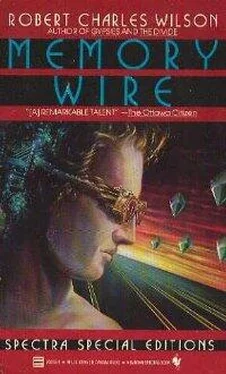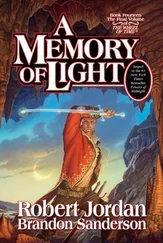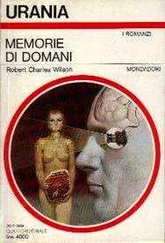Robert Wilson - Memory Wire
Здесь есть возможность читать онлайн «Robert Wilson - Memory Wire» весь текст электронной книги совершенно бесплатно (целиком полную версию без сокращений). В некоторых случаях можно слушать аудио, скачать через торрент в формате fb2 и присутствует краткое содержание. Год выпуска: 1987, ISBN: 1987, Издательство: Bantam Spectra, Жанр: Фантастика и фэнтези, на английском языке. Описание произведения, (предисловие) а так же отзывы посетителей доступны на портале библиотеки ЛибКат.
- Название:Memory Wire
- Автор:
- Издательство:Bantam Spectra
- Жанр:
- Год:1987
- ISBN:978-0-553-26853-9
- Рейтинг книги:4 / 5. Голосов: 1
-
Избранное:Добавить в избранное
- Отзывы:
-
Ваша оценка:
- 80
- 1
- 2
- 3
- 4
- 5
Memory Wire: краткое содержание, описание и аннотация
Предлагаем к чтению аннотацию, описание, краткое содержание или предисловие (зависит от того, что написал сам автор книги «Memory Wire»). Если вы не нашли необходимую информацию о книге — напишите в комментариях, мы постараемся отыскать её.
Memory Wire — читать онлайн бесплатно полную книгу (весь текст) целиком
Ниже представлен текст книги, разбитый по страницам. Система сохранения места последней прочитанной страницы, позволяет с удобством читать онлайн бесплатно книгу «Memory Wire», без необходимости каждый раз заново искать на чём Вы остановились. Поставьте закладку, и сможете в любой момент перейти на страницу, на которой закончили чтение.
Интервал:
Закладка:
He rose in the ranks. He acquired a certain notoriety.
He did not care to remember much of what happened during those years. What really mattered was that the war had given him an identity, a sense of self. He had been drafted out of a foster home in rural southern Texas, where his life had been a haze of fast violence and routine indignities. He was incredulous when a Juvenile Offenses worker told him he would love the Army. But he did. It was a fact. The Army had groomed and educated and disciplined him. The Army had analyzed and decoded him; the Army made him useful. And if the Army required him to practice his vices in the hinterland of this terrible country, then that was the least of what he owed them.
He assumed, when he was discharged, that the violent part of his life had also ended. He took civilian work with the Agencies on the recommendation of an Army buddy. He was a good field man, despite what Wyskopf had said. His life was stable—had been stable. And if he had not acquired a wife or family or the accouterments of a statistically normal existence, perhaps it was because he could not shake the image of himself as a Latent Aggressive, God’s Own, one of the blank-eyed minority born without a bump of sympathy. But he did not think about it often.
He had harbored a deep suspicion of the oneiroliths even before he was assigned to the Virginia facility. In part it was his instinctive fear and hostility for the foreign, the Other. But it was also a deeper revulsion. He disliked occupying a room where one of the stones had been. He was sensitive to the aura of them. It made his hair prickle, his stomach chum. He was conscious of the tremendous value of the oneiroliths, of the data being downloaded from them: but it represented a gift of unknown provenance, and gifts made him wonder about motives. Lots of abstract knowledge, but nothing about the Exotics themselves, who they were, where they had come from or why. And this strange interaction with the subjects from Vacaville. It was like all those antique movies. Body snatchers from outer space. Oberg took the idea seriously, though he knew the research people would laugh at him; the research people had no perspective. It was his business to be suspicious. He represented the federal agencies; he represented the less overt but no less solemn suspicions of his employers. For twenty years the world had been lulled into a blithe familiarity with these artifacts, while Oberg cultivated a professional paranoia.
But he had only been convinced of the essential evil of the stones with the arrival of the more potent deep-core oneiroliths from Brazil. He had seen their influence on hardened criminals like Tavitch… and he had felt it himself.
The contact was brief but unavoidable. He lived in the research compound and several times a day shuttled from his cell-like room to the communal toilets one locked door away from the inmates’ wing. He was making this pilgrimage one winter day, a cold front out of Canada seeping through the inadequate insulation and into the hallway of the cheap concrete buildings, when the wire-mesh security door burst open and the convict Tavitch came bulling through.
Tavitch was clearly insane. His eyes rolled, spittle flew from his open mouth. He stared back at the open door, ahead at Oberg. A pair of orderlies tumbled through behind him. They stood on two sides of Tavitch, panting; neither seemed to want to move. “You were supposed to lock the goddamned door!” one said. The other remained silent, eyes on Tavitch.
Tavitch, the murderer. Tavitch, who claimed to see into the past. Oberg felt his hackles rise. He was trapped in this tableau.
Tavitch stared at him. Their eyes met, and Oberg was appalled by the look of recognition Tavitch gave him. “Christ,” he said quietly.
Tavitch’s fist was clenched.
“Take him,” the second orderly said, but Tavitch ran forward then, directly at Oberg. Oberg’s instinct was to flinch away, but he was conscious of the orderlies watching him, and he threw a body check into Tavitch instead. They toppled onto the cold tile floor together.
The contact was momentary. A second, maybe less. But it was enough.
Horrified, Oberg felt the strangeness of the dreamstone pulsing through him.
He opened his eyes and saw a village deep in the hinterland. Some Indio village. Men in bowl haircuts and ragged T-shirts, women with their pendulous breasts exposed. Some deep river village, he thought dazedly, maybe refuge for a few sertao revolutionaries or an East Bloc weapons cache, more likely not: but there was a thread-rifle in his hand and the assault was on, he was in the midst of it, firing into their bodies, into their eyes like the startled eyes of deer caught in headlights, and he was getting into it, rolling with it; it was singing in him, the high eroticism of this mass kill. God’s Own. But suddenly it was not good at all. By some terrible miracle he was sharing their terror and their pain, these Indios he was killing, scything wire into his own body somehow, burning his own village. The pain and outrage boiled up in him unstoppably, and it was more than wounding: it opened a hole in him through which any horror might at any minute rush.
He gasped as the orderlies pulled Tavitch away and the corridor fell into focus around him. A nightmare, he thought desperately. But Tavitch stared down at him with a terrible, knowing leer.
“You and I,” Tavitch said. “You and I.”
Oberg threw up in the hallway.
He was methodical about his divorce from the Agencies. He drew a large sum of money from an Agency account in Belem before they cancelled his credit. And he had money of his own riding in hidden accounts Stateside.
He didn’t hold a grudge against Wyskopf or the people Wyskopf represented. Their naivete was inevitable; he associated it with their “bump of sympathy.” They took his concern with the oneirolith for an obsession, but it was not that. The connection was more subtle. Oberg was a Latent Aggressive, God’s Own, less than entirely human. Like the stone itself, he was a step outside nature. His understanding was therefore more subtle, more complete.
He knew a little about these people now. Teresa Rafael, Byron Ostler, Raymond Keller. He knew what they looked like. He knew where they had been. Most important, he knew where they were going.
He caught a morning flight. It was pleasant to see the Amazon falling behind him, the angles of it hidden by cloud, to rise effortlessly into the sunlight, spiraling east and then north, cut loose from history, cut loose from the Agencies, a loose cannon, purified in his purpose, aimed, he thought, and fired.
PART 2
WHISPERS FROM THE ANCIENT WORLD
CHAPTER 16
1. It would not have been safe to take her back to the studio by the tidal dams, so Byron located a tiny balsa deep in the Floats and put the last of his Brazilian money on the rent.
He liked the location. There was only the distant rise of the San Gabriels to remind him that the continent existed, salt breezes and morning fog to remind him of the sea. Otherwise it might have been some indefinite confluence of wood and water, paper houses rising on pontoon foundations, bobbing walkways, Chinese lanterns, eggbeater windmills ticking against the sky. A market canal ran in from the east, so there were fresh eggs and vegetables. A mixed — population, with maybe a plurality of Latinos and East Indians. Some decent jobs available at the wharves beyond the tidal dam, not too much violence. A good place, Byron thought.
He liked it more than he should have. It soothed him, and that was dangerous. He had to think about the future now … for Teresa’s sake as much as his own.
She wasn’t safe here. The terrifying thing was, she might not be safe anywhere.
Читать дальшеИнтервал:
Закладка:
Похожие книги на «Memory Wire»
Представляем Вашему вниманию похожие книги на «Memory Wire» списком для выбора. Мы отобрали схожую по названию и смыслу литературу в надежде предоставить читателям больше вариантов отыскать новые, интересные, ещё непрочитанные произведения.
Обсуждение, отзывы о книге «Memory Wire» и просто собственные мнения читателей. Оставьте ваши комментарии, напишите, что Вы думаете о произведении, его смысле или главных героях. Укажите что конкретно понравилось, а что нет, и почему Вы так считаете.












